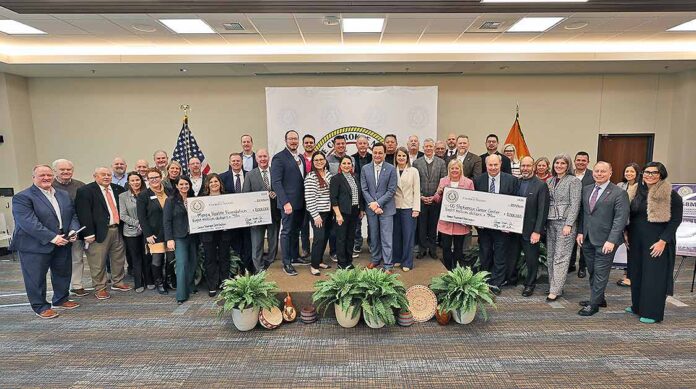TAHLEQUAH, OK – The Cherokee Nation recently celebrated an investment of up to $8 million each in strategic partnerships with Mercy in Fort Smith, AR, and the University of Oklahoma Health Stephenson Cancer Center in Tulsa, OK. The contributions will support state-of-the-art cancer treatment centers, providing critical care closer to home for Cherokee Nation citizens and others being diagnosed or battling cancer in the region.
“Cherokee Nation Health Services diagnoses nearly 400 new cancer cases per year, and we know that having treatment facilities within 60 miles of our citizens significantly increases their chances of survival,” said Cherokee Nation Principal Chief Chuck Hoskin Jr. “This investment ensures more hope and opportunity for our tribal citizens who need cancer care.”
The Cherokee Nation’s contributions are part of its larger initiative to improve cancer care access for its citizens. The effort aligns with the tribe’s mission of gadugi, the Cherokee value of working together for the benefit of everyone.
“These new facilities will be a lifeline for families who want to stay close to their communities while receiving care,” said Cherokee Nation Deputy Chief Bryan Warner. “More treatment options on or close to our reservation benefit not only Cherokee citizens, but also the surrounding rural communities. The Cherokee Nation takes cancer diagnosis and treatment seriously, and we are proud to invest in the necessary infrastructure.”
Partnership with Mercy Fort Smith
Mercy’s expansion of cancer services in Fort Smith will provide high-quality care to thousands of Cherokee Nation citizens in Northwest Arkansas and the River Valley. The tribe’s $8 million contribution will support Mercy’s capital campaign to create expanded patient access to screenings, diagnosis, treatment, and recovery.
“Mercy’s vision is to keep patients close to home while receiving care, which aligns with the Cherokee Nation’s focus and continued investment in the health and well-being of its citizens,” said Ryan Gehrig, President of Mercy Arkansas Communities. “Fort Smith and the surrounding communities will benefit for years to come from this collaboration between Mercy and the Cherokee Nation, which will help address the needs of cancer patients by expanding access and enhancing the care that’s currently available. We look forward to working together on a common goal: to improve the overall health and quality of care for local residents.”
Today, Mercy Fort Smith Oncology facilitates more than 25,000 patient visits annually, as more than 5,000 residents in its service area are newly diagnosed with cancer each year. The expansion of cancer care will include more than doubling the number of oncology and radiation oncology providers; adding surgical oncology specialists; incorporating essential technology; and expanding patient access.
Partnership with OU Health Stephenson Cancer Center
Cherokee Nation’s $8 million investment in OU Health Stephenson Cancer Center will support the development of its new facility in Tulsa. This expansion will extend the advanced, research-driven care provided at the National Cancer Institute-designated center to residents of northeastern Oklahoma, where cancer mortality rates are among the highest in the state.
Patients at the new center will have access to hundreds of clinical trials and innovative treatments for cancer, significantly improving outcomes.
“We are grateful for the Cherokee Nation’s generosity and for their partnership as we bring the highest level of cancer care and clinical trials to the people of northeastern Oklahoma,” said Gary Raskob, Ph.D., Senior Vice President and Provost of OU Health Sciences. “The Cherokee Nation shares our mission of ensuring that no Oklahoman has to compromise on the care they receive because of their geography. This gift represents a milestone in that effort.”
Since its opening, OU Health Stephenson Cancer Center has collaborated with the Cherokee Nation on initiatives such as lung cancer screenings, which provide early detection for high-risk patients. This new partnership will expand on those existing efforts and help address cancer disparities within tribal communities.
American Indian and Alaska Native populations in Oklahoma experience a 36% higher cancer incidence rate and a 73% higher cancer mortality rate compared to the general U.S. population. Limited access to diagnostic services and treatments has historically been a significant challenge for many patients. By partnering with leading healthcare institutions, the Cherokee Nation is taking meaningful steps to tackle these disparities head-on.
“These facilities represent more than health care infrastructure – they are a beacon of hope for our families and communities who have long struggled with the devastating effects of cancer,” said Dr. R. Stephen Jones, Cherokee Nation Health Services CEO and Executive Director. “We are proud to lead in advancing health care equity.”
The Cherokee Nation operates the largest tribal healthcare system in the country, providing care to more than two million patient visits annually.

















































